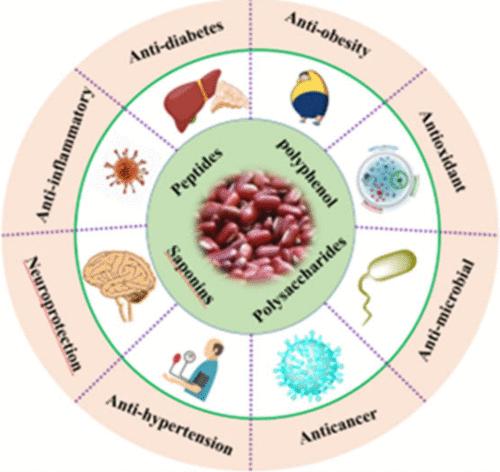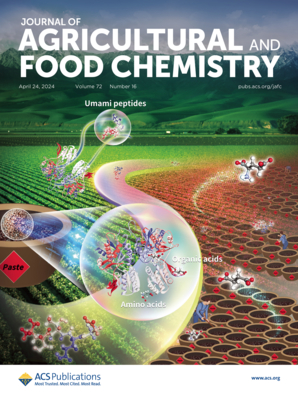小豆化学成分及功能特性研究综述
IF 6.2
1区 农林科学
Q1 AGRICULTURE, MULTIDISCIPLINARY
引用次数: 0
摘要
小豆(Vigna angulariz)是豆科豆豆属的一员,原产于中国,在东亚广泛种植。小豆以其丰富的营养而闻名,它富含碳水化合物、蛋白质和生物活性化合物,如多糖、多酚、类黄酮、皂苷和肽。这些成分具有广泛的促进健康的特性,包括有效的抗氧化、抗炎、抗糖尿病、抗肥胖、抗菌和神经保护作用。值得注意的是,小豆具有独特的功能特性,例如高抗性淀粉含量和通过促进有益细菌(如Akkermansia)调节肠道微生物群的能力,从而增强胰岛素敏感性和脂质代谢。这些特性使得小豆在治疗糖尿病、肥胖和心血管疾病等慢性疾病方面特别有效。此外,小豆在治疗肌肉萎缩、骨质疏松和癌症等疾病方面也有希望。发酵和热处理等加工方法进一步增强了它们的生物活性潜力,强调了它们在开发功能食品和营养保健品方面的适用性。本文综述了小豆的化学成分、功能活性及其作用机制,为小豆在食品和医药行业的应用提供有价值的见解,以预防和管理慢性病。本文章由计算机程序翻译,如有差异,请以英文原文为准。

A Comprehensive Review of the Chemical Constituents and Functional Properties of Adzuki Beans (Vigna angulariz)
The adzuki bean (Vigna angulariz), a member of the Vigna genus within the Leguminosae family, is native to China and extensively cultivated across East Asia. Renowned for its rich nutritional profile, the adzuki bean is abundant in carbohydrates, proteins, and bioactive compounds such as polysaccharides, polyphenols, flavonoids, saponins, and peptides. These components confer a wide range of health-promoting properties, including potent antioxidant, anti-inflammatory, antidiabetic, antiobesity, antibacterial, and neuroprotective effects. Notably, adzuki beans exhibit unique functional properties, such as high resistant starch content and the ability to modulate gut microbiota by promoting beneficial bacteria like Akkermansia, which enhance insulin sensitivity and lipid metabolism. These attributes make adzuki beans particularly effective in managing chronic diseases such as diabetes, obesity, and cardiovascular disorders. Additionally, adzuki beans show promise in addressing conditions like muscle atrophy, osteoporosis, and cancer. Processing methods such as fermentation and heat treatment further enhance their bioactive potential, underscoring their suitability for developing functional foods and nutraceuticals. This review highlights the chemical composition, functional activities, and mechanisms of adzuki beans, providing valuable insights for their application in food and pharmaceutical industries to prevent and manage chronic diseases.
求助全文
通过发布文献求助,成功后即可免费获取论文全文。
去求助
来源期刊
CiteScore
9.90
自引率
8.20%
发文量
1375
审稿时长
2.3 months
期刊介绍:
The Journal of Agricultural and Food Chemistry publishes high-quality, cutting edge original research representing complete studies and research advances dealing with the chemistry and biochemistry of agriculture and food. The Journal also encourages papers with chemistry and/or biochemistry as a major component combined with biological/sensory/nutritional/toxicological evaluation related to agriculture and/or food.

 求助内容:
求助内容: 应助结果提醒方式:
应助结果提醒方式:


